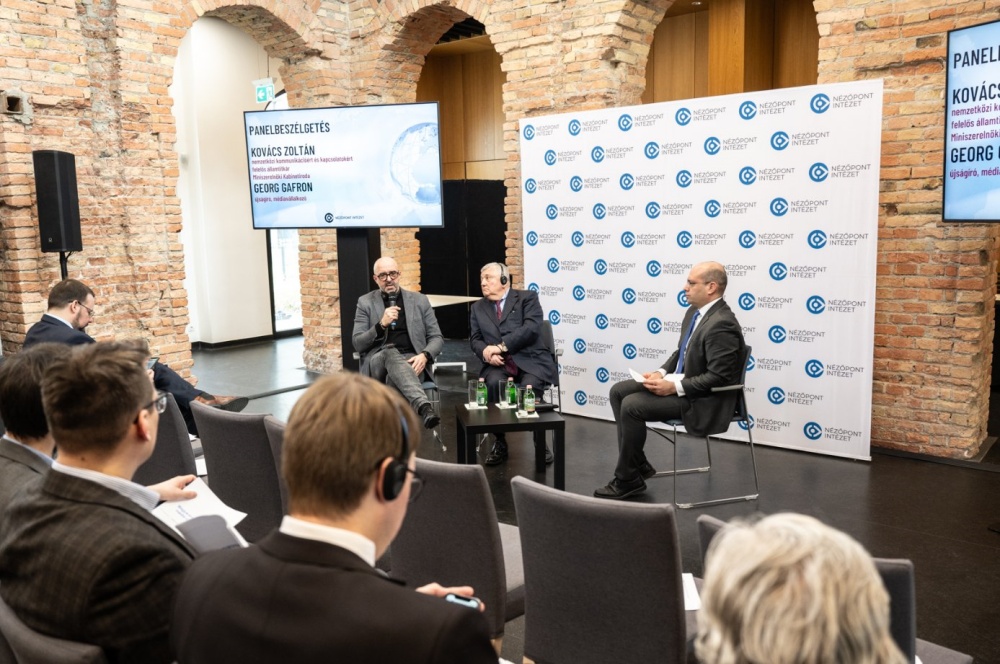
Bánk Levente Boros thinks that it is becoming increasingly common for the country's neutral perception to turn either positive or negative.Continue reading

In Austria, politicians and the media often convey a negative image of Hungary. The Friends of Hungary Foundation – publisher of Hungary Today and our sister site Ungarn Heute – tried to answer why this negative perception exists at a discussion at the Hungarian Embassy in Vienna on Friday. At the event titled “Talking with Hungarians about Hungary,” Bence Bauer, Director of the German-Hungarian Institute for European Cooperation of the Matthias Corvinus Collegium, spoke with Ágoston Sámuel Mráz, Director of the Nézőpont Institute, about controversial topics related to Hungary and gave the audience the opportunity to ask questions.
The event, organized with the kind support of the Hungarian Ambassador to Vienna, Edit Szilágyiné Bátorfi, was opened by E. Sylvester Vizi, President of the Friends of Hungary Foundation. He recalled that the Friends of Hungary Foundation was established with the aim of “informing the public in a value-oriented but objective way about the events from Hungary and to correct the one-sided description, the one-sided image about us, about the Magyars, and the false reports of some media organizations that can be read in the Western press, and to make the truth understandable for everyone.” E. Sylvester Vizi expressed the hope that many misunderstandings could be solved and many questions answered during the event.
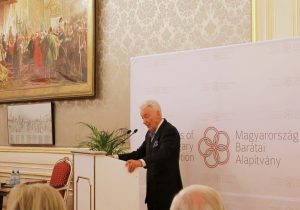
E. Sylvester Vizi. Photo: Ungarn Heute
Bence Bauer first asked Ágoston Sámuel Mráz about the resignation of Hungarian President Katalin Novák and its consequences. The analyst explained that with the resignation of Katalin Novák, the country had lost a talented politician, but knowing the background, the resignation was the only right move. In his opinion, the resignations of Katalin Novák and former Justice Minister Judit Varga put an end to the scandal surrounding an earlier amnesty – in which a man convicted of covering up several pedophile incidents at a Hungarian children’s care home was pardoned by President Novák.
He recalled an interview with János Áder on Kossuth Radio, in which the former president said that the rules of the pardon procedure have not changed since the fall of communism.
The former head of state emphasized that it is a two-stage procedure, meaning that no minister, no member of the government, no prime minister and no external person other than the Minister of Justice has a say in the pardon process.
“In ten years, the Prime Minister has never asked for clemency or even asked me a question about a clemency case,” emphasized János Áder. According to Ágoston Sámuel Mráz, the interview also makes it clear that neither Prime Minister Viktor Orbán nor the government bear any responsibility in the clemency case.
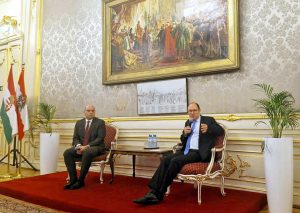
Ágoston Sámuel Mráz (L) and Bence Bauer (R). Photo: Ungarn Heute
The discussion also addressed the question of why the Western press paints a very negative picture of Hungarian politics and why the goals and communication of the Hungarian government are often misunderstood. The director of the Nézőpont Institute sees one reason for this in the fact that the alternative way of thinking about politics, values, Christianity, migration and, of course, war, which the Hungarian government represents, is confusing for many liberal politicians. Another reason is that
the language of Hungarian politics is completely different from that of political correctness.
In Hungary, politics is conducted loudly, with emotions, with linguistic attacks, and many Europeans no longer understand this. The third reason, in his opinion, is that nobody understands Hungarian, they do not understand the irony of the Hungarian language. In the Hungarian language, there is irony behind many harsh words, but when these are translated into German or English, you often have unacceptable, unqualified texts that do not have this sharpness in the Hungarian language. Moreover, the phenomenon of Viktor Orbán is not really understood in the West either. People do not understand how a prime minister can be in office for 14 years and how it is possible that if elections were held on Sunday, according to a poll by the Nézőpont Institute, Fidesz and Viktor Orbán could receive 50 percent of the vote.
Bence Bauer also asked Ágoston Sámuel Mráz about the essence of the Hungarian model. The analyst said that the first point is full employment: in 2010, the government promised to create 1 million new jobs, and it succeeded. Now there is a new slogan to achieve 85 percent employment, that means creating 300,000 more jobs. The government has not succeeded in stopping the population decline, that is another of its goals, and the birth rate is now at 1.5 in Hungary, the director of the Nézőpont Institute continued. The third point he mentioned was the creation of national capital, which in his opinion has been established in the last 14 years. The fourth point is that the Orbán government has built up the Hungarian defense industry in recent years, which did not even exist in 2010, as it was completely dismantled after the fall of communism. Finally, he mentioned migration, where the government’s position is that illegal migration must be stopped and that it is up to the national authorities to control who is allowed to enter the territory of a given state. The analyst recalled that the government had encountered many difficulties in Brussels because of this.
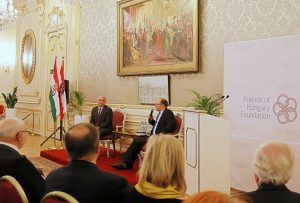
Ágoston Sámuel Mráz (L) and Bence Bauer (R). Photo: Ungarn Heute
Ágoston Sámuel Mráz noted ironically that he now hears the opinion from the West that Hungary’s migration policy is fine, but that the government should not have used such “nasty” language. This Western recognition was a turnaround in Europe. In his opinion, the government must work to ensure that this turnaround leads to a political change in Brussels and that it is understood that migration policy should be guided by the Hungarian model.
The analyst assumes that a completely new Europe will emerge in the summer after the European elections.
The big challenge for Viktor Orbán will be to become one of the decision-makers and rulers in Europe. If he succeeds, it would be a strong signal that a change in migration policy is necessary. Asked about the EP elections, Ágoston Sámuel Mráz recalled that the Hungarian position is that the EP should not be directly elected, but that the national parliaments should send their representatives, as was customary between 1958 and 1979. According to the analyst, this proposal by Viktor Orbán is a counterpoint to the liberal mainstream, a tactical consideration with the aim of finding a compromise in the middle. The government’s aim could be to initiate a joint reflection on the role of the European Parliament, he noted.
In response to a journalist’s question, Samuel Ágoston Mráz said that
Viktor Orbán seemed to be isolated in Europe on February 1, but he had returned home with some very important results.
The first was the European Council’s decision that the European Commission must decide objectively on EU funds. The second was that the Hungarian Prime Minister had been promised that the Fidesz party can join the ECR group, the analyst emphasized. After 2021, it seemed that the relationship between Giorgia Meloni and Viktor Orbán was not as trusting as previously assumed, he recalled. However, since September last year, the situation has changed and the politicians have started to think about Europe together again. Whether this joint reflection will take place in the ECR group or in a new party after the European elections remains to be seen. The analyst recalled that there are new candidates who might be interested in joining a new party, such as France’s Marine Le Pen. Ágston Sámuel Mráz assumes that something new will emerge on the European stage after the elections, that could become the third largest party on the European stage after the EPP and the Socialists. If Le Pen, Meloni and Orbán join forces, such a party could no longer be excluded from European decision-making, he emphasized.
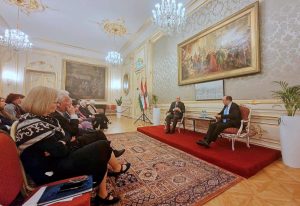
Ágoston Sámuel Mráz (L) and Bence Bauer (R). Photo: Ungarn Heute
The analyst was also asked about the situation of Hungarians in Transcarpathia and the government’s policy towards Hungarian minorities in Ukraine. Ágoston Sámuel Mráz explained that there are no longer 156,000 Hungarians living in Transcarpathia, as stated in a 2001 survey. There are no official figures on the exact number, but the director assumes that there could be 100,000 fewer due to the war, which the Hungarian minority does not consider to be their own. Moreover, Hungary introduced dual citizenship in 2010, he recalled. This was an opportunity for Hungarians from Transcarpathia to come to Hungary, to the EU. However, their connection to Transcarpathia remained intact and the possibility of returning was given. Due to the war, however, this possibility no longer exists, so that
these people are unjustly losing the place they called home for a thousand years,
said Ágoston Sámuel Mráz. For this reason, the Hungarian government is trying to strike a balance with the Ukrainian government, which he believes will be difficult. He recalled that a meeting of the Hungarian and Ukrainian foreign ministers took place in January to prepare a meeting between the prime ministers of the two countries. According to the director, a settlement would mean that the Ukrainian government accepts that the Hungarian minority is an asset to the country and that it restores the rights that this minority had before 2015.
Via Ungarn Heute, Featured image: Ungarn Heute